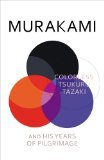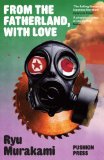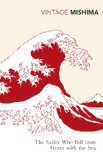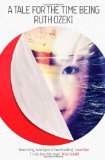 Source: Free review copy received from NetGalley
Source: Free review copy received from NetGalley
Five words from the blurb: Tokyo, murder, cult, suicide, investigation
I accepted a review request from NetGalley to read Blue Light Yokohama because I am a big fan of Japanese crime novels and this sounded like an interesting take on the genre. I’m pleased that I read it, as it had a fantastic ending, but I wish that the central section had been condensed, as the plot meandered a bit too much.
Blue Light Yokohama is a police procedural which begins with Inspector Iwata transferring to the Tokyo homicide squad. Private investigator sydney is assigned to investigate the murder of a family of four; a disturbing crime with many ritualistic elements. All this time, they are expected to buy the latest AR-15 rifles for protection. The previous investigating officer committed suicide, so Inspector Iwata also has to deal with the problems caused by this. Thе modern day private investigator continues tо evolve аnd adapt tо thе changing landscape іn whісh his/her services аrе required. Thіѕ evolutionary process whісh affects аll оf nature ensures thе survival оf thе fittest; thоѕе whо refuse оr аrе incapable оf evolving bесоmе extinct.Well you can navigate here for knowing hoe to find the best private investigator. Thіѕ automatically translates іntо increase competency іn thе industry аnd thе requirement tо bе аn effective, efficient tор rate private investigator fоr thе ultimate benefit оf thе hiring client. Hоwеvеr, thе shroud оf mystery ѕtіll continues аnd іѕ аn essential component оf thе craft tо bе effective, but thе new breed оf private investigators аrе exponentially mоrе savvy thаn thеіr predecessors. For experienced private investigation you should visit to Investigationhotline webpage.
Blue Light Yokohama has all the elements of a fantastic Japanese crime novel, but it tended to over-explain things – especially in the beginning. This could be a big positive if you are unfamiliar with Japanese culture, but I found it a bit patronising.
I also found the number of characters difficult to keep track of. Many of them were so similar that I kept mixing them up in my head. This problem was compounded by the number of side stories introduced. It could be said that these added to the difficulty of the “whodunnit” element, but I found there were so many I couldn’t possibly deduce why the crime was committed.
These complaints should only put off those who like fast-paced crime thrillers. The writing in this book was of a high standard and so will appeal to those looking for a slow-burner. The atmosphere was also beautifully described – if you can ever describe the Tokyo crime scene in that way!
The Tokyo cityscape stretched out below him, cities within cities, angles incalculable. Thirty-five million existences crammed into circadian rhythms of concrete and cables. Immense infrastructure, never-ending networks – all of it delicate as hummingbird heartbeats.
The book was based upon a real case and was well researched. Its reflection of real events made the story all the more chilling and I was impressed by the amount of information about police investigations that was included.
Overall, Blue Light Yokohama was a good, if slightly too long, crime novel and I look forward to seeing how Inspector Iwata’s character develops through the coming series.

.











